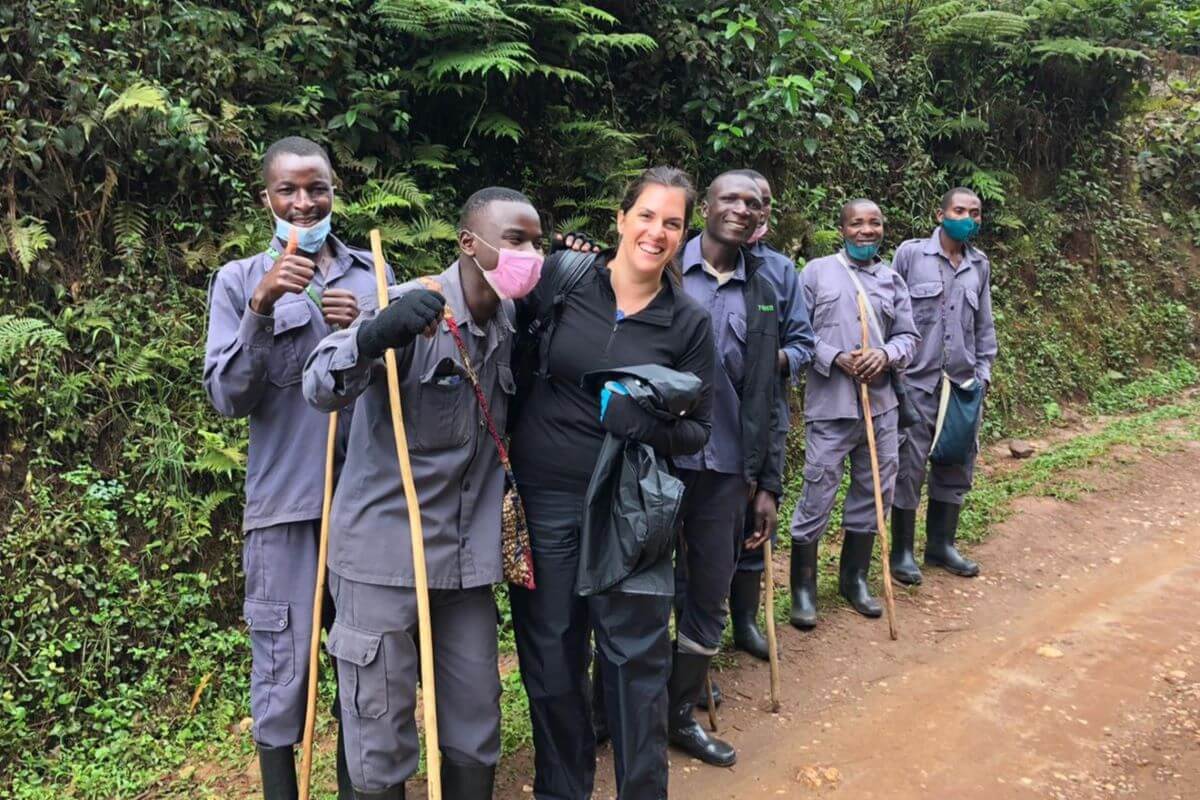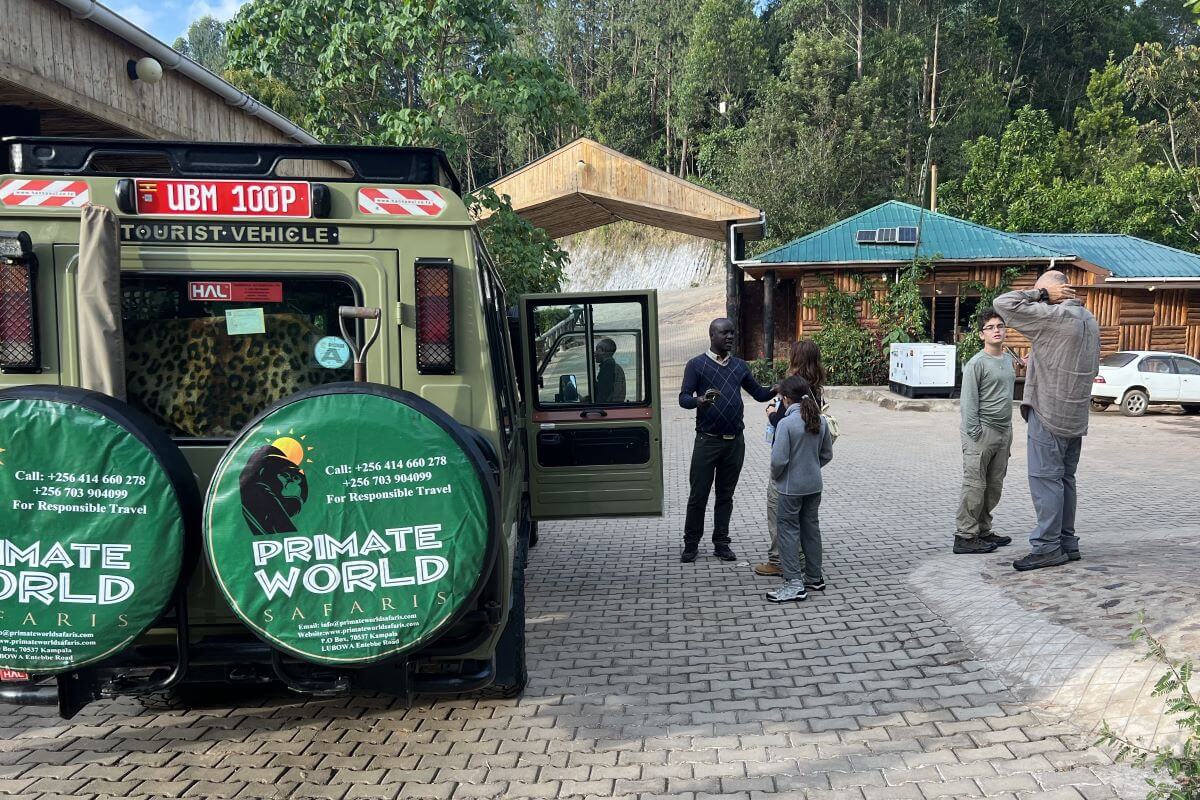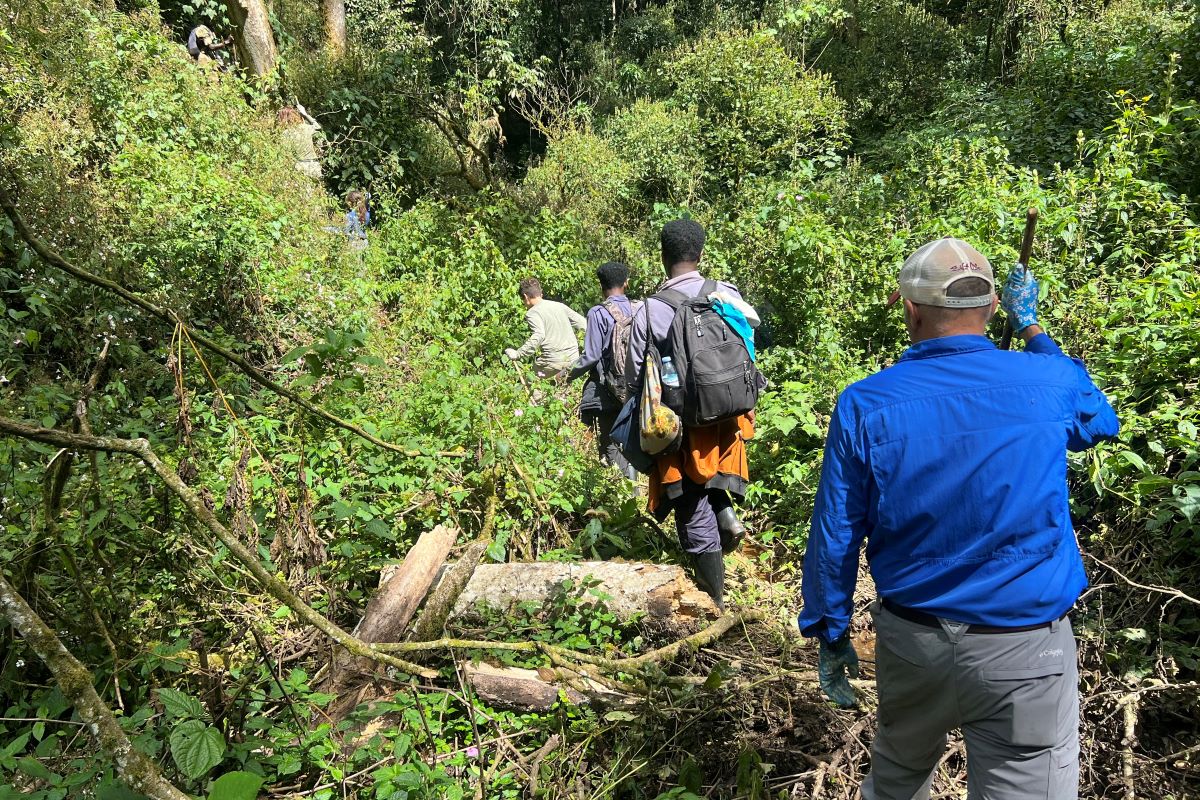Chimpanzee habituation is a unique experience that allows you to spend time quality time with our closest cousins, the chimpanzees. Chimpanzees are tailless apes with long, black hair and large protruding ears. They live in large groups called troops in the tropical forests of Africa.
Chimpanzees are wild animals and habituation is done to make them get used to human presence for research and tourism purposes. This is done through long encounters with people led by researchers and guides and by reducing proximity with each encounter. It can take even up to 3 years for the chimpanzees to get used to humans.
The experience allows you to study and deeply understand the behaviors of these playful primates that you wouldn’t observe on a standard chimp trek.
Chimpanzee Habituation is an all-day activity that begins very early in the morning so that you can see the chimpanzees’ de-nesting. Throughout the day, you will watch the chimpanzees do other things like feeding, hunting, breastfeeding, mating, resting, and building new nests at night.
The experience begins at the park headquarters where you will meet your guides for the day. Here, the guides will brief you about the experience and how to behave in the forest and around the chimpanzees.
After being briefed, you will head into the forest led by guides and park rangers. Along the way, the guides will tell you more about the forest and the animals that call it home.
You may spot some other primates along the way such as black and white colobus, grey-cheeked mangabey, and red-tailed monkey. There are also many bird species that you may see including
Your guides will also show you different signs of chimpanzees like footprints and broken branches. As you get closer to the chimpanzees, you may hear some vocalizations.
It may take some time to find them but once you do, you will spend several hours watching them from a safe distance.
You will be able to see chimpanzees doing their daily stuff like playing, eating, and maybe grooming each other. It’s like watching a big family of curious and smart monkeys.
Your guides will tell you interesting facts about chimpanzees and how they live. You can ask questions too!
You will be expected to follow some guidelines for the safety of yourself, the chimpanzees, and the environment during the Chimpanzee Habituation experience. These include;

Chimpanzees live in the tropical forests of Africa and tracking them may require hiking for several hours. The hike during the habituation experience is even more challenging than that of chimp tracking because the chimpanzees are deeper in the forest and keep changing locations.
Make sure that you are physically fit before going for the trek. Doing regular exercises, including cardio and strength training, can help prepare your body for the trek.
We recommend comfortable and sturdy hiking boots with good traction to help you navigate through uneven terrain. Lightweight, breathable clothing is also important, along with a hat and sunscreen for protection against the sun. Don’t forget insect repellent to keep away insects.
You may also consider bringing essential items like a camera (with silent mode if possible) to capture the moments without disturbing the animals, binoculars for better viewing, and a small backpack to store your belongings.
The hike is physically demanding and you’ll need to stay hydrated and energized throughout the journey. Bringing along plenty of water and high-energy snacks like nuts, granola bars, and fruits will help to keep your energy levels up.
Follow Instructions
Listen carefully to the instructions provided by your guides before the trek begins. They will brief you on safety precautions, behavior around the chimpanzees, and what to expect during the trek. Following their guidance ensures a safe and enjoyable experience for everyone.
Remember that you are entering the chimpanzees’ natural habitat. Maintain a respectful distance from them and avoid making sudden movements or loud noises that could startle or disturb them. Observe quietly and follow your guide’s lead on how to interact with the chimpanzees.
Be prepared to spend several hours in the forest searching for the chimpanzees because these are unhabituated groups that live deeper in the forest. Patience and persistence are key; sometimes, it’s the journey itself that’s most rewarding.
Weather conditions can change quickly, so be prepared with rain gear or extra layers. Also, be ready for the possibility of encountering other wildlife along the way.

Kibale National Park is the best place to go for Chimpanzee habituation. Kibale is a 321 sq km park in western Uganda mainly made up of an evergreen forest. It hosts 13 primate species including over 1000 chimpanzees.
Kibale National Park is accessible via road from Uganda’s capital, Kampala. This journey takes about 6 hours.
You can also use a domestic flight which takes about 1 hour from Entebbe to Kasese Airstrip. This airstrip is only 1 hour away from the park.
There are also daily scheduled flights from other parks such as Bwindi Impenetrable National Park, Semliki National Park, and Lake Mburo National Park.
If you are planning to participate in Chimpanzee Habituation, you will need a permit.
The price of a Chimpanzee Habituation permit for various groups of visitors is as follows:
| # | Visitor Type | Price per person |
| 1 | Foreign Non-residents | 300 USD |
| 2 | Foreign residents | 250 USD |
| 3 | Ugandans & Citizens of the East African Community | 250,000 UGX |
The price does not include other expenses like transport, accommodation, meals, guide fees, porter fees, tips, and other activities. Therefore, you should budget accordingly and make sure you have enough money to cover all your needs.
Chimpanzee habituation helps researchers study chimpanzees up close to learn about their behavior, health, and how they live in the wild. They can understand how they communicate, find food, and live in their natural habitats. This information is used to find better ways of protecting chimpanzees and their habitats.
It is also used for educational experiences, where people can learn about chimpanzees and why it’s important to protect them. With the new knowledge, people become stewards of conservation and advocates for responsible travel to protect the chimps and their habitats.
Additionally, it can support local communities by creating jobs for the people who live around the forests like porters and guides.

The best time for Chimpanzee Habituation experience is during the dry season, which runs from December to February and June to September.
During this time, there is usually less rainfall, which means forest trails are less muddy and easier to navigate.
The vegetation during this time is less dense so it is easy to see the chimpanzees with fewer obstructions.
The dry season, however, is associated with high tourist numbers. This means that permits and accommodation are in high demand and may be hard to obtain on short notice. We recommend that you book them earlier on to secure your spot and avoid disappointment.
The wet season, on the other hand, has its perks. With fewer tourists and lush greenery, the experience is more intimate and exclusive. More so, accommodation prices may be lower during the wet season, making it a more budget-friendly option.
So, while the dry season may offer good conditions for chimpanzee habituation experiences, habituation can be done all year round. If the dry season doesn’t match with your travel plans, you can still enjoy the experience during other times of the year.
In the end, it all comes down to your preferences and the availability of the permits. Whichever you choose, the experience will still be wholesome.
